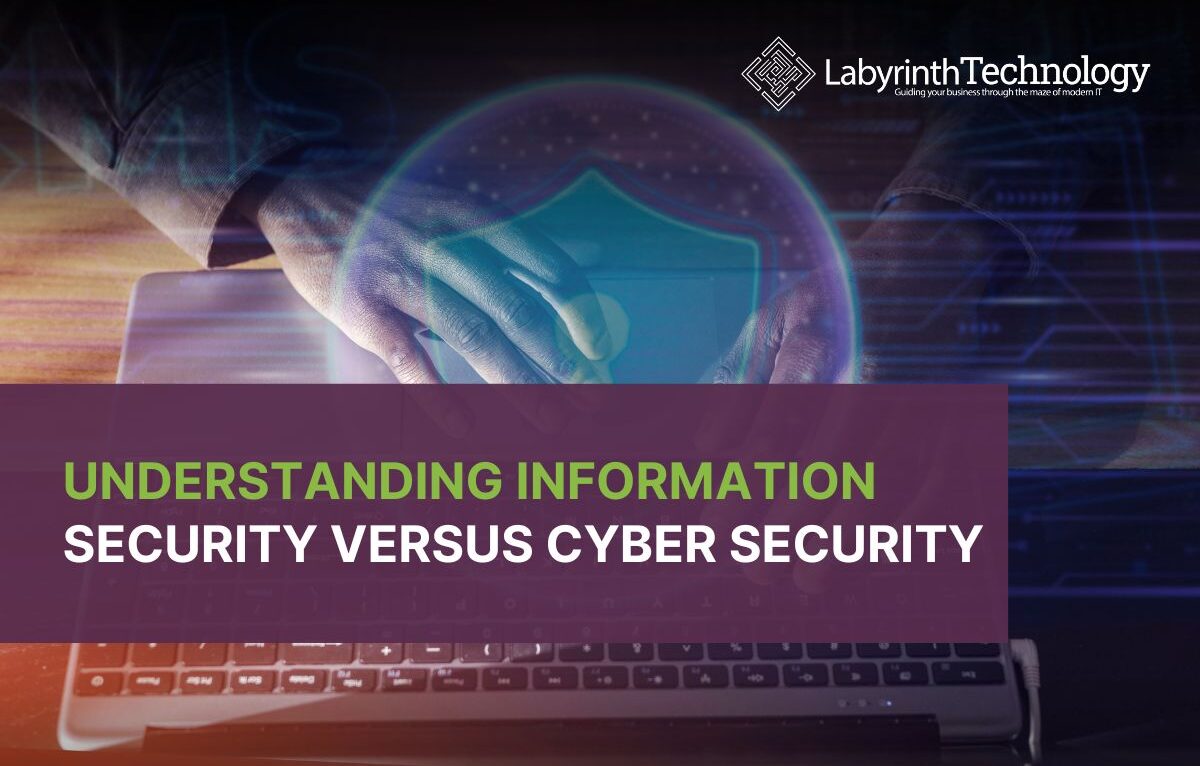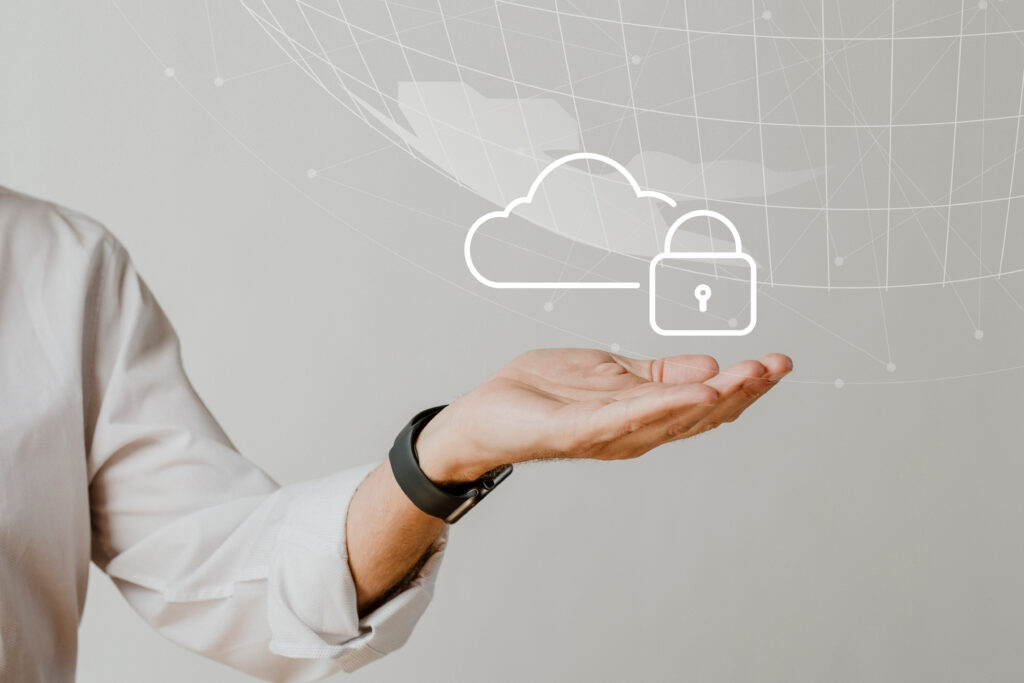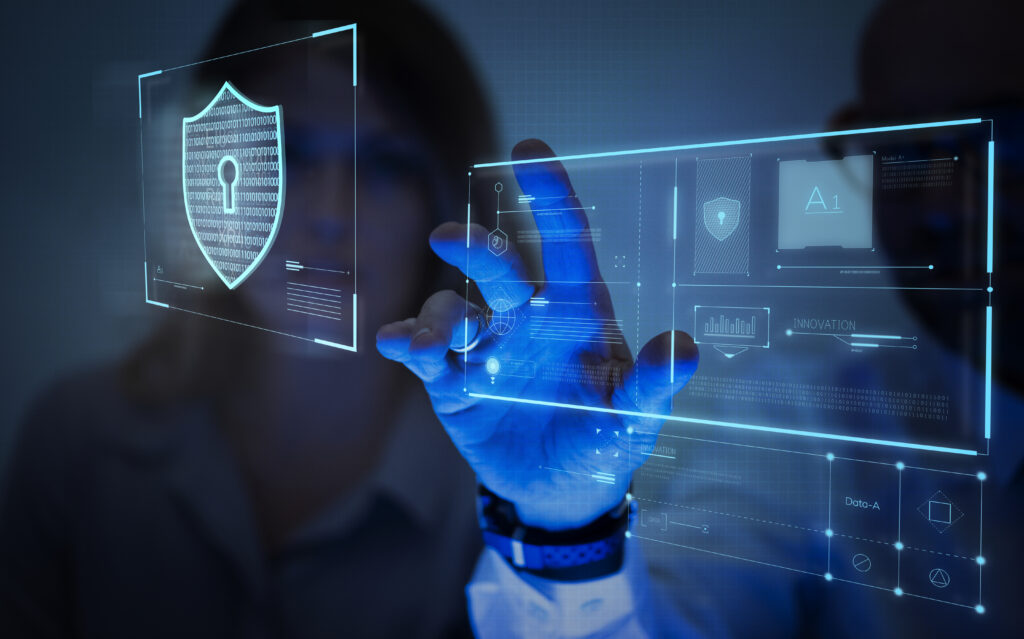
When it comes to information security versus cyber security, the two terms are often confused but they are not the same. Information security focuses on protecting all forms of confidential and sensitive information, whether physical or digital. Cyber security focuses on defending computer systems, internet connected systems, and digital information from cyber threats. Both are vital to a strong security posture, and working with experienced security professionals ensures your business data is safe from both physical and digital risks.
You might have heard the terms information security and cyber security used interchangeably. They sound similar and both deal with protecting data, but they have different scopes. In today’s environment, where cybersecurity threats are constant and organisations hold more sensitive information than ever, it is important to understand what each discipline covers and how they overlap.
At Labyrinth Technology, we speak with businesses across London who are increasingly aware of the risks. Many want clarity on information security versus cyber security so they can build robust security measures that truly protect their critical data. Let’s break it down clearly.

Information security is about protecting information in every form. It covers both digital data and physical records like paper files or printed reports. At its heart, information security focuses on the three principles of confidentiality, integrity and availability. This means making sure only authorised users can see confidential information, ensuring that information stays accurate through strong data integrity checks, and making sure it is accessible when needed.
Information security deals with much more than just computers. It includes physical security such as locked filing cabinets, CCTV, or smart door systems that prevent physical security breaches. It also includes access controls and access management policies that prevent unauthorized electronic access to sensitive data.
To protect your information systems, information security professionals and information security analysts may use data encryption, security tools, and antivirus software. They also evaluate how intellectual property, business data, and electronic communications systems are managed and stored.
Put simply, information security is about protecting information in any form, not only digital.

Cyber security is a branch within information security, but it has a more specific focus. It deals with protecting data and defending computer networks, mobile devices, and internet connected systems from cyber threats. These can include cyber attacks like phishing, malware, social engineering attacks, ransomware, or supply chain attacks.
Cyber security focuses on defending against online threats that try to gain access to digital data. A cybersecurity analyst or team of cybersecurity professionals may use tools such as intrusion detection systems, anti malware software, and cloud security platforms to reduce risk.
While information security vs cyber security often overlap, cyber security professionals spend more time dealing with cyber incidents, responding to breaches, and running incident response plans. They focus on protecting information that lives within computer systems, digital information that flows through electronic communications systems, and critical infrastructure that could be disrupted by attackers.
So, what are the key differences between information security and cybersecurity?
The main difference is scope. Information security vs cyber security boils down to this:
Information security is broader. It covers both information security for digital and physical records, looking after confidential and sensitive information no matter where it lives.
Cyber security is narrower. It focuses mainly on protecting electronic data, computer networks, and digital information from unauthorized electronic access and cybersecurity threats.
Think of information security as the umbrella. Cybersecurity and information security overlap under that umbrella, but each has its own set of tools and best practices.
For example, a physical security measure like a locked safe protects paper records, which falls under information security but not cyber security. On the other hand, antivirus software and security systems that defend against online threats fall under cyber security. Both are essential to protect critical data and confidential information.
Businesses face risks from all sides. Cyber incidents such as phishing emails or ransomware are common, but so are security breaches involving lost paperwork, insider leaks, or weak access management.
Focusing only on cyber security means you could still face physical security breaches. Focusing only on information security without the digital defences could leave your computer systems exposed to hackers.
That is why organisations need robust security measures that cover both information security and cybersecurity overlap. This combination strengthens your security program and reduces cyber risk.

Your security program should include security tools, data encryption, and access controls. This ensures only authorised users can access confidential information and that data confidentiality and data integrity are maintained.
You need regular data evaluation and identify vulnerabilities in your systems. A strong risk management process helps reduce chances of cyber incidents or security breaches.
Most cyber attacks exploit human error. Teaching staff how to spot social engineering attacks, how to handle confidential and sensitive information, and how to use security practices like strong passwords makes your first line of defence stronger.
Use anti malware software, antivirus software, and intrusion detection systems to protect computer networks and mobile devices. This helps prevent hackers from gaining unauthorised access to digital data.
If you use cloud platforms, make sure cloud security is a priority. Encrypt files, manage access controls, and regularly review your organization’s security posture to protect digital information in remote environments.

At Labyrinth Technology, we help London businesses take control of their security posture. Our team supports clients in building robust security measures that protect against both cybersecurity threats and physical security breaches.
We look at your information systems as a whole. That means focusing on cybersecurity and information security together, improving network security, and safeguarding confidential and sensitive information across your organisation. Whether it is reviewing security practices, tightening access management, or deploying the right security tools, we help you protect your business data and strengthen your defences.
Understanding information security versus cyber security is key for any business leader. One protects all forms of information, the other focuses specifically on cybersecurity threats. Both are essential for safeguarding your critical data, protecting against security breaches, and keeping your organization’s security posture strong.
By working with experienced security analysts and cybersecurity professionals, you gain the peace of mind that your confidential information, intellectual property, and electronic data are protected from every angle.
At Labyrinth Technology, we are here to guide you through that process and ensure you stay ahead of the security landscape. Get in touch today.
Empowering London Businesses with Efficient IT Solutions to Save Time and Stay Ahead of the Competition.